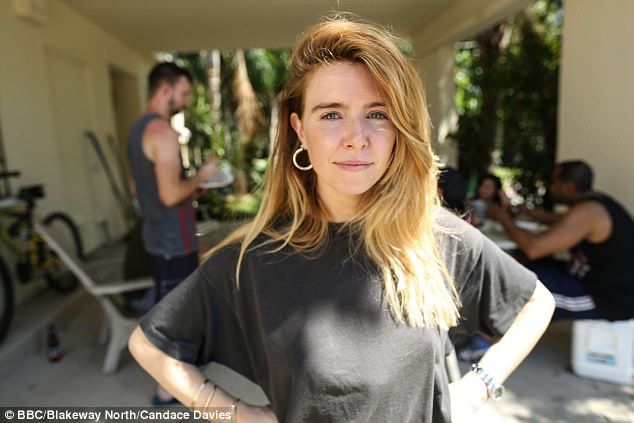Inspiring female journalists of our time
Stacey Dooley
Stacey Dooley is a BBC Three presenter and investigative journalist. Her first television appearance was at age 21 in Blood, Sweat and T-shirts in 2008. She was selected as one of six Brits who travelled to India to live and work with garment workers. The series aimed to shed light on the working conditions and lives of the people who make the clothes we find in high street shops. It elevated the stories of the workers behind our throw-away-fashion culture, and was nominated for Best Factual Series at the 2009 BAFTA television awards.
The popularity of the show, and her interest in third-world labour laws, resulted in her own show Stacey Dooley Investigates in 2009. Since then she has presented 38 episodes in the series on topics including child labour and child soldiers, drugs, domestic violence, and child pornography. She has also done other series such as Stacey Dooley in the USA, which included episodes on women’s prisons and homelessness in Detroit.
She was selected as one of six Brits who travelled to India to live and work with garment workers
What is most inspiring is the breadth of subject matter of Dooley’s work, its intersectionality, but also a consistent theme of looking at problems through the lens of women and women’s rights. Indeed, her career began in an investigation of the garment industry; women make up 85-90% of sweatshop workers according to dosomething.org. In 2015 she devoted two episodes exploring the world’s worst place to be a woman, and more recently in January 2018 she released an episode entitled ‘Russia’s War on Women’.
Dooley’s work has exposed injustice and problems that face women across the globe, investigating a wide variety of issues. Journalism like that of Stacey Dooley, is essential in elevating stories of injustice, and extending the feminist fight beyond our lives and borders.
Her body of work illustrates the importance of the interconnection of women’s struggles around the world. It is this kind of journalism on major platforms like the BBC that is essential for real change. Half the battle is awareness; it is incredibly easy to turn a blind eye and choose not to understand that choices made in our lives have ramifications for women across the world. Additionally, journalism like this aids in understanding that commitment to feminism means commitment to supporting causes and struggles that don’t directly affect us. It can also help audiences understand the intersection of gender with factors like class, ethnicity, and geography.
Women’s voices are essential in all journalism, for balance and new perspectives that perhaps in contributing to conversations working towards mediation. But female journalists play an essential role in the march towards equality. It is our duty as women who have won the right to speak and write freely, to speak up, and fight for, those who have not.
Christiane Amanpour
Christiane Amanpour is considered one of television’s leading news correspondents. Amanpour’s fearless and uncompromising approach made her popular with audiences, and a force to be reckoned with by global influencers. In 1996, Newsweek said that her reporting from conflict hotspots in the Gulf and the Balkans had helped make CNN “must-see TV for world leaders”.
Amanpour spent much of her upbringing in Tehran, Iran, which enabled her initial recognition at CNN. In 1979, when the Iran revolution toppled the shah, her family was spurred into exile. Her personal connection enabled her 1985 piece on her home nation to win the DuPont award, which allowed her to overcome the resistance she faced from being put on the air due to her international accent and dark hair.
But it was her historical coverage of the Bosnian crisis in the late 1980s and early 1990s that helped make her the internationally recognized correspondent she is today. On the ground during the siege of Sarajevo, Amanpour exposed the brutality of the war, reporting on the daily tragedy of life for civilians in the city. She was outspoken, calling out the human rights abuses, massacres and genocide committed against the Bosnian Moslems, when speaking on this issue she said, “There are some situations one simply cannot be neutral about, because when you are neutral you are an accomplice.”
There are some situations one simply cannot be neutral about, because when you are neutral you are an accomplice
Throughout her time at CNN Amanpour has secured exclusive interviews with global power players. In the wake of the September 11 attacks she was the first international correspondent to interview British Prime Minister Tony Blair, Pakistani President Pervez Musharraf and Afghan President Hamid Karzai. During the height of the Arab Spring she conducted an Emmy-winning interview, with Libya’s former leader ‘Colonel’ Moammar Gadhafi, she was also the last journalist to interview Egypt’s President Hosni Mubarak just before he was deposed.
She was the first journalist to interview Brazilian President Dilma Rousseff following her country’s shocking defeat in the 2014 World Cup semi-final. She also had the rare opportunity to sit down with Venezuelan President Nicolas Maduro, talking to him about the widespread violent demonstrations in his country.
In addition to her work, Amanpour is an active rights campaigner. A board member of the Committee to Protect Journalists, the Centre for Public Integrity and the International Women’s Media Foundation, she has used her profile to raise awareness of key global issues and journalists’ rights. She has interviewed educational rights activist Malala Yousafzai for CNN on several occasions — bringing focus to her courage and international advocacy work.
“I believe that good journalism, good television, can make our world a better place.”

Comments